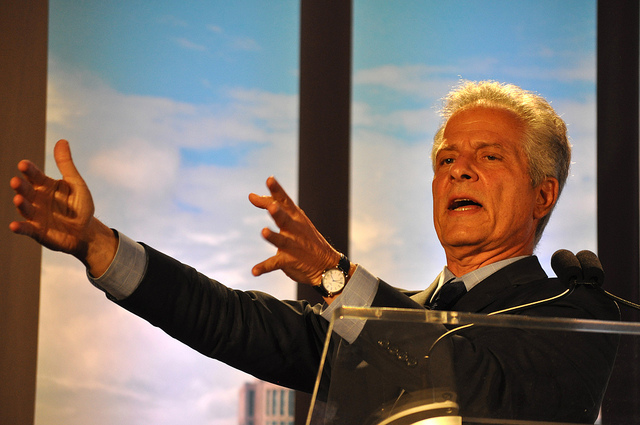
Project for Lean Urbanism refining research to inform field
Incoming CNU President Lynn Richards gives her first public speech since accepting the position (she joins at 11:18 mark in this video). Credit: Congress for New Urbanism.
Andrés Duany is a founding principal of Duany Plater-Zyberk & Co. and president of the Center for Applied Transect Studies, which recently received Knight Foundation support for its Project for Lean Urbanism.
Andrés Duany. Credit: Michigan Municipal League.
At last month’s Congress for the New Urbanism in Buffalo, N.Y., the Project for Lean Urbanism introduced its first research products. Over three days, attendees presented 20 draft position papers and case studies. Discussion and debate followed each presentation, to solicit feedback so the authors can refine the drafts, which can be found at leanurbanism.org/publications. Videos of the presentations will soon accompany the papers.
The discussions that followed were often lively, and sometimes quite helpful. A particularly controversial presentation was of Robert Orr’s paper, “The Problems with LEED,” in which he proposed that LEED certification from the U.S. Green Building Council, now a de facto code, is too complicated, time-consuming, and expensive, and that LEED (Leadership in Energy and Environmental Design) buildings too often fail to perform as advertised.
Also presented was a draft of the first tool, the Lean Scan, an assessment protocol designed to identify a community’s social capital and underutilized physical assets.
Finally, there were also presentations for two future books on Lean Urbanism. The first will be introductory, explaining the problems that inspired this movement and some proposed solutions, organized by the seven platforms that underpin the project: Lean Building, Lean Development, Lean Business, Lean Green, Lean Regulation, Lean Infrastructure, and Lean Learning. That book will be available by this fall.
The second book will profile 10 case studies that inform and confirm the potential for Lean Urbanism. The case studies will be presented in pairs that highlight their salient aspects. For example, small-scale redevelopment will be compared in Detroit, and Starkville, Miss. In Detroit, that redevelopment is taking place over a large area, by numerous hands, while Starkville’s Cotton District is the product of one primary developer. In another study, the massive subsidies and ponderous pace of recovery in New Orleans’ Lower Ninth Ward will be contrasted with the Vietnamese enclave that, without such subsidies, recovered so quickly.
Knight Foundation’s grant to the Project for Lean Urbanism supports three years of activity. This first year is dedicated primarily to research, with roughly 40 position papers and case studies commissioned on a variety of subjects, plus videos and books as described above. That research will inform the drafting of tools and pilot projects to be implemented in the second year, providing opportunities to test and refine the tools. In the third year we’ll finalize the tools and release them to the public to use freely.
Recent Content
-
Communitiesarticle ·
-
Communitiesarticle ·
-
Communitiesarticle ·


